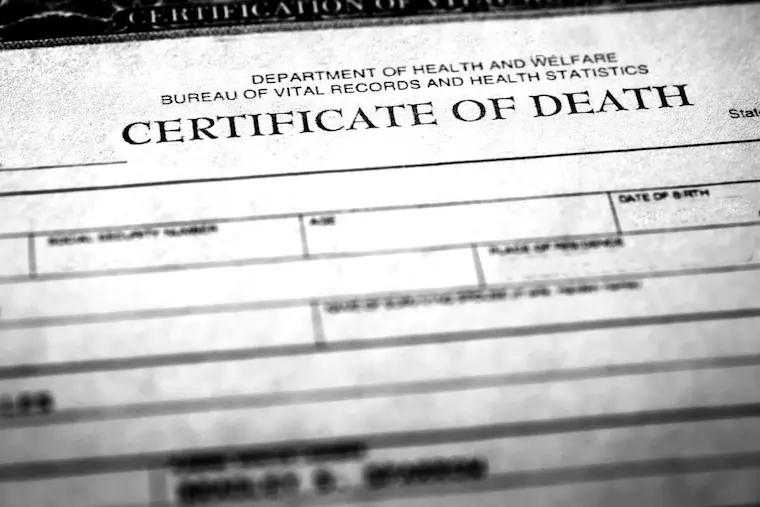In this article, we’re exploring “How long after a person dies will beneficiaries be notified?”
This will include details on how people are notified when they are notified, and answers to common questions on the topic.
This article is part of our free series on private banking and inheritance management, ranging from Liechtenstein private banks to expat wealth management, which you can click here to access right now.
Feel free to use the table of contents to jump ahead to the sections most relevant to you.
Table of Contents
- How Long After a Person Dies Will Beneficiaries Be Notified?
- Notifying Beneficiaries When a Person Dies
- Frequently Asked Questions
- Do You Want Help Opening Bank Accounts?
How Long After a Person Dies Will Beneficiaries Be Notified
How long after a person dies will beneficiaries be notified may depend on the jurisdiction where the estate is being managed and the circumstances of the passing. However, in almost all situations, beneficiaries will be notified within three months of the will being filed in the probate court. At this time, all beneficiaries will be listed as public records.
Do You Want More Private Banking Insights?
Sign up here to receive our Free Private Banking Starter Guide and weekly updates on the best account opening options available:
Notifying Beneficiaries When a Person Dies
Notifying beneficiaries when a person dies is one of the most important (and legally required) roles that an executor will play. The time for notifying beneficiaries will vary depending on the structure of the document as there is a difference between a will and a trust, which you can learn about by clicking this link.
However, in general, beneficiaries will be notified within three months of the passing.
Probate Lawyer Notifying Beneficiaries
A probate lawyer refers to an attorney who assists the executor of a will. They may also be engaged by one of the beneficiaries in order to represent their interests as they go through the probate process. With this in mind, it is possible that the probate lawyer would be engaged by the executor to notify the beneficiaries of an estate.
How Are You Notified If You Are a Beneficiary?
How you are notified if you are a beneficiary, may vary but in most cases, the executor of an estate will contact the beneficiaries and inform them directly. This notice usually comes in the form of a certified letter, confirming their status as a beneficiary.
Additionally, if you have not been contacted by the executor, you can review the records of the probate court in order to confirm through public records whether you are listed as a beneficiary or not. If you are listed as a beneficiary, you can then contact the executor directly for more information.
How Long Does It Take for Assets to Be Released After Death?
How long it takes for assets to be released after death depends on the type of assets, the quantity and complexity of assets, and related reporting requirements. For example, while many estates and the related liabilities can be settled in a matter of months, more complex estates can take multiple years to settle and for assets to be distributed to the beneficiaries.
Frequently Asked Questions
Below are three of the most common questions that we receive from people looking into how long after a person dies will beneficiaries be notified. If you have further questions you would like answered, don’t hesitate to get in touch with us directly.
What Is Probate?
Probate is what you might consider the final court process to ensure assets and possessions are distributed correctly to the intended beneficiaries in line with the wishes of the deceased individual. Importantly, probate is also the point in time when the executor will be appointed to settle the affairs and liabilities of an estate.
When Should an Executor Notify Beneficiaries?
An executor should notify beneficiaries as soon as appropriate for the situation, and no later than after a will has entered probate. This is especially important because assets will enter public record at this point in time.
How Do Beneficiaries Receive Their Money?
How beneficiaries receive their money will depend on the wishes of the individual passing. However, it can also depend on the mechanisms in place. Likewise, the specific assets being distributed can also impact how money is received. For example, money can be distributed by check, bank transfer, or even cash. On the other hand, real assets often require deeds to be transferred through official property registries.
Do You Want Help Opening Bank Accounts?
If so, you can access GlobalBanks Insider and start the process of applying for an offshore account in a few clicks.
GlobalBanks Insider is a dedicated account opening solution that involves direct support from our team and direct introductions to the banks of your choosing. It gives you instant access to the…
+ Direct support from a team of banking experts
+ Direct introductions to your desired banks
+ Answers to your most pressing questions and challenges
+ Expert insights on which banks to choose & why
+ Plus FULL access to our entire suite of account opening tools and intelligence!
And “yes!” GlobalBanks Insider is designed to help foreign and non-resident individuals and companies open bank accounts.
You can learn more on the products page from the main menu above.

